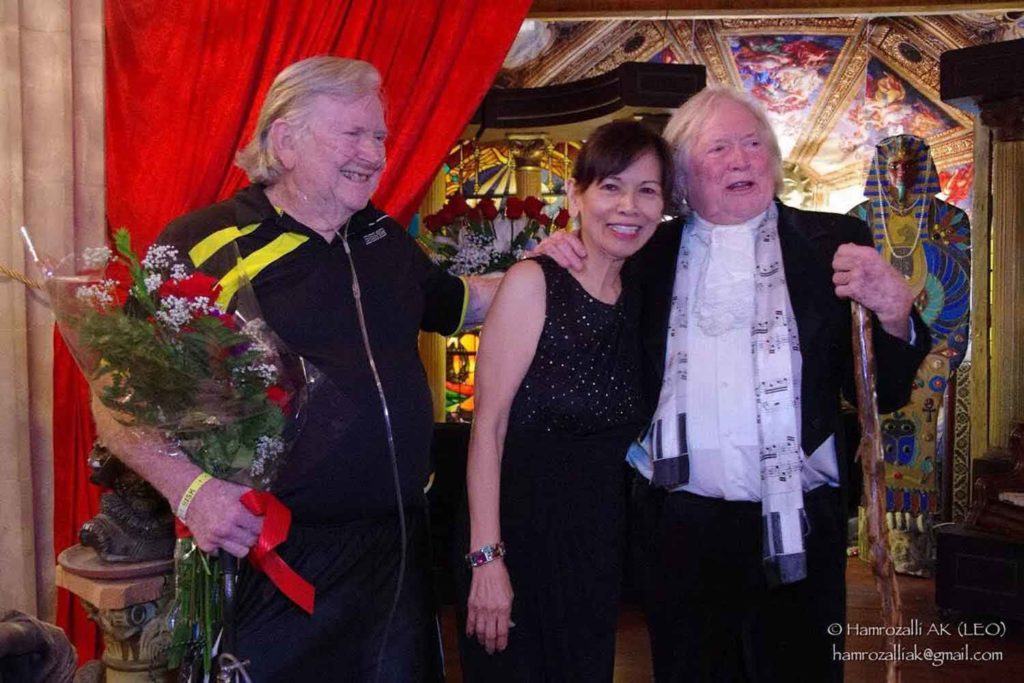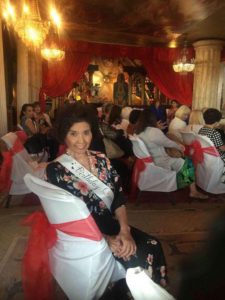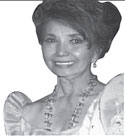PEERLESS on its grace and splendor with changes subtle and grand, noble and patriotic, this unending testimony of class, tradition and old-world elegance has left even the most eloquent of connoisseurs bereft of words.
A mix of restored pieces, paintings, chandeliers of the most skillful Murano, glassblowers, and its mirrors and fireplaces are the enduring testimonies of Hollywood’s golden era.
With the austere staircase tells the tales of who had worked the steps to witness musical and humanitarian events played on at Maestro Dexter and Linda Grey’s home, complete with a Parisian-setting musical salon with French 18th-century architecture.

The historic castle is more storied than any.
On a recent Sunday, the Greys invited a few close friends to their Holly Mont Castle and enthralled each during a magnificent concert.
I remember the celebration welcoming the “Magic Piano,” with all its 3,000 pounds, that took more than a decade to be reunited with the Maestro. It was hoisted by a giant crane and carried by a dozen help a day before.
You succumb to a kind of spell in the presence of his musical exploits and personal dynamics. The priceless magic piano is currently valued at a million dollars, with the rest of its parts made from instruments of the 17th and 18th centuries. The maestro said the piano produces “supernatural music” that represents the most graceful music in the world.
“After an eleven-year odyssey, as soon as my fingers touched the keys, I seemed to be under a mystic music spell and played spontaneously as if Chopin and Liszt were directing me,” the Maestro said.
Maestro Dexter Grey’s world-renowned musical personality as a pianist, showman, and star of stage, screen and television has received a spectacular record of standing ovations. His performances have drawn worldwide critical acclaim, from the crowned heads of Europe and Emperors of the Orient.

The Maestro bowed gently, beamed broadly, grand were his gestures, as he spread out his arms wide, to subdue the throng of friends and admires rousing his musical enchantment that came before he even played a single note.
His repertoire was not an invitation, but a step into another time, another world as he transported us into bygone eras, when love meant “to go out and love, suffer and wound, but celebrate love’s strength [and] not complain of its difference.”
In one minute the Maestro could be the gentlest, but in another second, he conveyed fiery and bullish strength and romantic splendor in a rich flexibility of expression.
That evening, he gave us two hours of poetry of passion and inspiration – graceful salon pieces, in a melancholic numbers of variation – rondos, marches, nocturnes, sonatas, rolling up the keys in arpeggios, meandering the audience to a frenzy, with boldness of attack or light hands playing with charm and rhythmic volatility. A pleasurable electric shock passed through the audience and held them spellbound with his powerful hands, yet they were possessed of suppleness and differentiations, that gave a musical feeling that cannot be equaled.
We swooned as he played Franz Liszt, romancing the ladies with the famous Liebestraum, and were thrilled to take the rhythmic drive of his Hungarian Rhapsodies as the emperor of pianists swept up and down the keyboard with his revolutionary new music.
The gaiety and charm of old Vienna were captured as we waltzed down the cobblestone streets with John Strauss or visited with the deaf Beethoven as his Moonlight Sonata filled the room.
We visited the exotic island of Majorca with Frederic Chopin as he serenaded the beloved Madame George Sand with the ever-popular Fantasie Impromptu and the haunting melody of Chopin’s music confided… and played form the heart by Maestro Dexter Grey, was like listening to mingled prayers of broken hearts, that revolt of fettered souls, the pain of slavery, loss of Freedom’s ache, the cursing of tyrants, and the exulted songs of victory.
But that one evening so great was the novelty when the emphasis was on the performer. Starting with his flawless musicality, the adornments from the egocentric, little wheels of his virtuoso mind took us away from the churches, cathedrals, and halls of earlier times and to the human soul’s convulsions of love, hate, joy and fear through his tempo rubatos, legatos, trills, and adagios. Yet, pleading for reason, his absolute lucidity for freedom, poetry, and maniacs, almost Byronic, were familiar to the human heart.
The Maestro knew the impact he was making and wasn’t exactly averse to adding a little drama of his own. Think of indescribable performances in Vienna, Poland’s fight for its liberation with Walesa, and all over the globe, who can forget when he played on the Great Wall of China as the Ambassador of Peace between East and West, where he scared the daylights of his audience when he lifted his hands high and came crashing down the keys, as he swept up and down the keys, the string almost snapped. Each time he played the Heroic Polonaise, no piano was safe in a stupor of his arrangement of a crescendo of difficulties and embellishments that spoke of galvanizing and electricity.
He was intemperate, then, in a legato on Etude Op. 10, No. 12 that flowed like oil or silk heaving in an ocean, heavenly melodies weaving and in and out of time. The Immortal Waltz melted hearts more than any other piece of music.
There are the autumn leaves that reminded us all of the sadness, as the Maestro’s agony of expression and redemption was displayed. But by the end, it mingled with a radiant smile of joy when he gazed at his beloved wife, Dr. Erlinda.
His finale was Chopin’s Heroic Polonaise in A-flat to buoy the spirits of a city savagely stricken by uninterrupted Nazi bombs — that last piece of music, played before the city surrendered to the Nazis, started with a few bars of prelude, into a storm of rain like runs, hail like trills, lightning arpeggios of a thunder chord. He did not rush over the keys, he made the floor shake and the whole audience was wrapped in sound, prayers of broken hearts, revolt of fettered souls, the pain of slavery, lost Freedom’s ache, and the cursing of tyrants to exultant songs of victory.
All of this emanated from the magical piano of the Maestro in deep spirituality and incomparable poignancy.
Across the years, the Maestro’s output has been exquisite and stupendous. At 84, he is infallible, always searching for new, richer and deeper views of musical interpretation.
The piano was not simply an instrument in his hands, but it was one of joy, chagrin, death, romance, and the feeble mutterings of a man near his death.
It’s birth and life combined — the mourning over the fate of his country, resignation, and love wept in his blessed fingers. His hands fluttered on the lyrical keys like two butterflies, so light and so delicate one cannot imagine that they would be able to bring out the impossible fortissimo of an exultant victory.
***
E-mail Mylah at [email protected]







